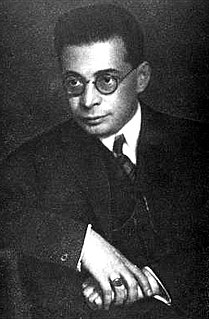A Quote by Angelina Grimke
The tendency of organization is to kill out the spirit which gave it birth. Organizations do not protect the sacredness of the individual; their tendency is to sink the individual in the mass, to sacrifice his rights, and to immolate him on the altar of some fancied good.
Quote Topics
Related Quotes
Children will, in my dream, be taught that laziness and narcissism are at the very root of human evil, and why this is so. . . . They will come to know that the natural tendency of the individual in a group is to forfeit his or her ethical judgment to the leader, and that this tendency should be resisted. And they will finally see it as each individual's responsibility to continually examine himself or herself for laziness and narcissism and then to purify themselves accordingly.
For the whole consequence of evolution from blind impulse through conscious will to self conscious knowledge, seems still somehow to correspond to a continued result of births, rebirths and new births, which reach from the birth of the child from the mother, beyond the birth of the individual from the mass, to the birth of the creative work from the individual and finally to the birth of knowledge from the work.
The mainspring of creativity appears to be the same tendency which we discover so deeply as the curative force in psychotherapy, man's tendency to actualize himself, to become his potentialities. By this I mean the organic and human life, the urge to expand, extend, develop, mature - the tendency to express and activate all the capacities of the organism, or the self.
It is possible that an individual may be successful, largely because he conserves all his powers for individual achievement and does not put any of his energy into the training which will give him the ability to act with others. The individual acts promptly, and we are dazzled by his success while only dimly conscious of the inadequacy of his code.
Civil rights are those which appertain to man in right of his being a member of society. Every civil right has for its foundation some natural right pre-existing in the individual, but to the enjoyment of which his individual power is not, in all cases, sufficiently competent. Of this kind are all those which relate to security and protection.
There are some terrific resources on how to find individual purpose but relative resources on how to discover purpose and apply to an organization. My challenge was to show organizations how they could unlock the purpose of their organizations and put it to good use for employees to apply to their own jobs. The net effect is to help individuals, teams and organizations to optimize performance by understanding how to use purpose for good intention.
The only proper, moral purpose of a government is to protect man's rights, which means: to protect him from physical violence - to protect his right to his own life, to his own liberty, to his own property and to the pursuit of his own happiness. Without property rights, no other rights are possible.
Some sort of belief in all-powerful supernatural beings is common, if not universal. A tendency to obey authority, perhaps especially in children, a tendency to believe what you're told, a tendency to fear your own death, a tendency to wish to see your loved ones who have died, to wish to see them again, a wish to understand where you came from, where the world came from, all these psychological predispositions, under the right cultural conditions, tend to lead to people believing in things for which there is no evidence.
Any group or "collective," large or small, is only a number of individuals. A group can have no rights other than the rights of its individual members. In a free society, the "rights" of any group are derived from the rights of its members through their voluntary individual choice and contractual agreement, and are merely the application of these individual rights to a specific undertaking... A group, as such, has no rights.
































